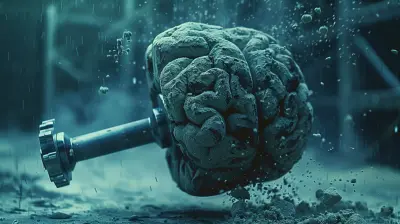The Science of Grit: Unlocking Long-Term Mental Strength
16 June 2025
Have you ever wondered how some people manage to keep going when everything around them screams "Give up!"? Maybe it's the student who studies relentlessly despite repeated failures, or the athlete who trains daily in silence, far from the arenas of fame. They all seem to share a secret weapon — one that's not flashy, not loud, but incredibly powerful. That, my friend, is grit.
Grit is the quiet force behind long-term resilience and mental strength. It's not about having the perfect mind or even a high IQ. It's about having the stamina to stay on your path, especially when the road is bumpy, foggy, or uphill.
Let’s dive deep into the mesmerizing world of grit — not with a magnifying glass, but with a curious, open heart.
What Exactly Is Grit?
So, what the heck is grit, anyway? Is it passion? Perseverance? A stubborn refusal to quit?Actually, it's all of those — and more.
Angela Duckworth, a psychologist and author of the best-selling book Grit: The Power of Passion and Perseverance, defines it as a combination of passion and sustained persistence toward long-term goals. It’s the ability to keep pushing even when progress is painfully slow or invisible.
In other words, grit isn’t about a single burst of energy — it’s about the slow burn, the steady drumbeat. It's the marathon runner of traits.
Grit vs. Talent: The Eternal Tug-of-War
We all admire talent. It’s shiny. It grabs attention. But here’s the plot twist: talent alone doesn’t guarantee success. Shocking, right?Grit is like the tortoise in that age-old fable — not the flashiest, but steady and determined. Talent may give you a head start, but without grit, it fizzles out. Grit stays. Grit trains day after day, shows up when no one’s watching, and thrives in discomfort.
Let me ask you — which would you bet on: raw talent or relentless effort?
The Neuroscience Behind Grit
Alright, let’s geek out for a moment. What’s happening in the brain of a gritty person?It turns out that grit rewires the brain. Consistent effort fuels neuroplasticity — that’s the brain’s way of saying, “Hey, I can change.” When you repeatedly face challenges and power through, you’re training your brain to become more resilient.
It’s kind of like lifting weights. The more mental resistance you encounter and overcome, the stronger your neural pathways for perseverance and focus become.
Also, dopamine — the so-called "motivation molecule" — plays a role. Small wins and progress trigger this feel-good chemical. Gritty people don't wait for massive success to feel good; they chase progress, however small. And their brain rewards them for every step.
Why Grit Beats Motivation Every Time
Let’s be honest — motivation is a bit of a diva. One day it’s here, the next it’s gone. It’s an emotional high, and like all highs, it fades.But grit? Grit is loyal.
Grit doesn’t care if you're tired, uninspired, or feeling a little blah. It gets up anyway. It shows up, not because it feels like it, but because it decides to.
It’s discipline’s cooler cousin. It’s consistency’s right hand.
That’s why in the long run, grit beats motivation hands down.
The Psychology of Sticking With It
Here’s the psychological truth: long-term goals are hard. They don’t offer instant gratification. Sometimes they don’t offer any gratification for years.But gritty people have a different perspective.
They don’t need immediate results because they’ve trained their minds to focus on the process more than the outcome. They find meaning in showing up, in putting in the reps, in becoming better — not just in being better.
This mindset shifts the way they experience challenges. Instead of seeing failure as proof they’re not good enough, they see it as part of the journey — maybe even a badge of honor.
Can You Learn Grit?
Great news: Yes, you absolutely can.You’re not born gritty or not. Just like you can train your muscles, you can train your mind. It’s all about building mental habits that support long-term effort.
Here’s how you can start strengthening your grit muscle today:
1. Find Your “Why”
Long-term goals need fuel. That fuel is purpose. Knowing why you’re doing something keeps you going even when things get rough.So, ask yourself — what am I fighting for? What matters more than my discomfort?
2. Practice Delayed Gratification
We live in a world of instant noodles and same-day shipping. But grit thrives in delay. Learn to love the wait. Relish the process.Try this: next time you’re tempted for a quick fix reward, hold off. Observe the craving. You’re rewiring your brain for long-term satisfaction.
3. Embrace the Suck
Let’s not sugarcoat it — long-term goals often suck. There are boring parts. Frustrating parts. Lonely parts.Gritty people lean in anyway. They know discomfort is part of the price.
So next time things get dull, don’t hit eject. Stay. Breathe. Keep going.
4. Track Progress, Not Perfection
Grit loves progress. Even tiny baby steps. So track what you’re doing — not to judge yourself, but to see how far you’ve come.Celebrate the small stuff. It keeps the dopamine flowing and your grit growing.
5. Surround Yourself With Gritty People
Energy is contagious. If you’re constantly around people who quit at the first sign of struggle, it’s easy to mimic that.But gritty people inspire you to dig deeper. They remind you of your own strength when you forget.
Real-Life Grit: Stories That Speak
Let’s paint this concept with real-life brushes.J.K. Rowling
Before Harry Potter was a global phenomenon, she was a single mom on welfare, facing rejection after rejection from publishers. Did she give up? Nope. She kept writing. That’s grit.Thomas Edison
The guy failed more than 1,000 times before inventing a working light bulb. Most of us would’ve called it quits at, oh, failure #10. Edison called each failure “another step forward.”Bethany Hamilton
The pro surfer who lost her arm in a shark attack but returned to surfing — not just casually, but competitively. That’s grit in a wetsuit.Grit in Everyday Life
You don’t have to be a famous inventor or world-class athlete to live with grit.Grit is in the single parent working two jobs to raise strong, kind kids.
Grit is in the student who studies late into the night even when they’re behind and overwhelmed.
Grit is in you — every time you choose persistence over ease, purpose over pleasure, long-term goals over short-term comfort.
It’s not a superpower. It’s a decision.
Grit and Mental Health: A Delicate Balance
Let’s talk about an important caveat.While grit is powerful, it’s not about pushing yourself to the point of burnout. Mental toughness isn’t ignoring your needs — it’s respecting them while still moving forward.
Being gritty doesn’t mean being emotionless. It means being aware of your emotions, acknowledging them, and choosing to move forward with them, not against them.
So yes, take breaks. Rest is not the opposite of grit — it’s part of it.
The Long Game
Grit asks one thing of you: stay in the game.It doesn’t ask you to win today. It doesn’t even ask you to be the best. It just asks you to not quit.
Even when your progress feels like crawling.
Even when no one else sees your effort.
Even when the dream feels far away.
Because the truth is, most people give up on the 99th step — not realizing the treasure's buried at the 100th.
Final Thoughts: Are You Ready to Grit It Out?
The science of grit isn’t just brain scans and motivation hacks. It’s a soul-level shift. It’s the willingness to keep showing up, to trust the timing of your progress, and to fall in love with effort itself.You don’t need to be special. You don’t need to be fearless. You just need to be consistent.
So, next time life dares you to quit, dare it back with your grit.
all images in this post were generated using AI tools
Category:
Mental StrengthAuthor:

Janet Conrad
Discussion
rate this article
2 comments
Macey McWain
Embracing grit is the key to unlocking our true potential! Every challenge we face is an opportunity to grow stronger and more resilient. Let’s celebrate our journey, stay committed, and cultivate that unwavering spirit to achieve our dreams. Keep pushing forward!
November 16, 2025 at 5:31 PM

Janet Conrad
Thank you for your insightful comment! Embracing grit indeed plays a crucial role in fostering resilience and achieving our long-term goals. Let’s continue to support each other on this journey!
Zeth Hubbard
Embracing grit transforms challenges into growth opportunities. Cultivate resilience and determination, and you'll unlock your true potential for lasting success and fulfillment!
June 21, 2025 at 3:07 AM

Janet Conrad
Thank you! Embracing grit indeed empowers us to turn obstacles into opportunities for growth and success. Your support for cultivating resilience is truly inspiring!


